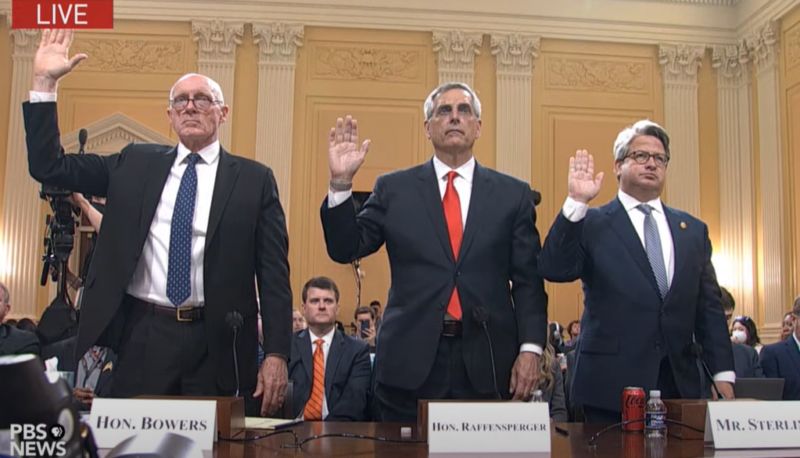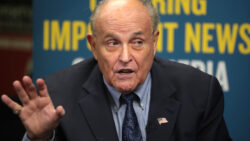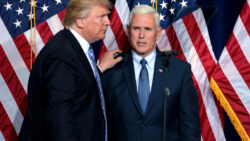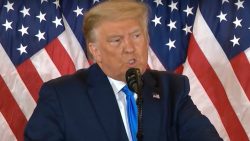The House select committee investigating the Jan. 6 attack on the U.S. Capitol held its fourth public hearing Tuesday. Investigators laid out how in the months-long effort to overturn the 2020 presidential election, former President Donald Trump and his allies launched a pressure campaign on local election officials and state legislators in battleground states won by Joe Biden to falsely declare the election stolen from Trump.
“Trump had a direct and personal role in this effort,” Republican Committee Vice Chair Rep. Liz Cheney said in her opening remarks.
The committee had four in-person witnesses: Arizona House Speaker Rusty Bowers; Georgia Secretary of State Brad Raffensperger; Gabriel Sterling, a top election official in Georgia; and Wandrea “Shaye” Moss, an election worker in Fulton County, Georgia. Each was either pressured by Trump to change the results or became the victim of his baseless attacks.
Here are four takeaways from day four of the Jan. 6 public hearings.
‘We just don’t have the evidence’: Trump’s team couldn’t provide evidence of voter fraud.
Among the witnesses called forward was Republican Arizona House Speaker Rusty Bowers. Trump lawyers John Eastman, Rudy Giuliani, and Jenna Ellis, as well as Rep. Andy Biggs and Trump himself pressed Bowers—who supported and voted for Trump—to remove Arizona’s electors in favor of those who would vote for Trump.
Bowers repeatedly asked Giuliani and Ellis to provide evidence for their claims that thousands of dead people had voted. They didn’t provide him that evidence or any other evidence that illegal votes were cast in Arizona. “No one provided me such evidence, ever,” Bowers said.
At one point, he said, Giuliani even admitted they didn’t have evidence. “We’ve got lots of theories, we just don’t have the evidence,” Giuliani told him and other Republicans, according to Bowers.
Despite Bowers telling Trump he would not decertify electors, Trump lawyer John Eastman called Bowers a few days later, urging him to do just that. When Bowers asked why he would violate his oath to the Constitution and to Arizona’s laws without sufficient proof, Bowers said Eastman told him, “Just do it, and let the courts sort it out.”
Bowers refused to do so.
Trump was personally involved in the fake-electors plot, even though his own White House counsel said it “was not legally sound.”
Among the strategies to overturn the election pursued by Trump and his team was an effort to replace a state’s electors with “alternative” fake electors who would vote for Trump.
The committee interviewed Republican National Committee Chairwoman Ronna McDaniel who, in her taped testimony, said Trump requested the RNC’s help in coordinating this effort. McDaniel said that while they were on a conference call, Trump introduced Eastman to talk about convening “contingent electors” in case Trump’s legal challenges turned a state in his favor. McDaniel said that to her knowledge the Trump campaign took the lead on this effort while the RNC aided the effort.
As Trump lost lawsuits, some of Trump’s campaign lawyers, including Justin Clark and Matt Morgan, began to distance themselves from the effort they saw as inappropriate. The White House counsel’s office also found the plot to be potentially illegal, according to testimonies by those in the Trump White House.
Even after he was told clearly and repeatedly that his claims were lies, Trump kept repeating them.
In earlier hearings, the committee demonstrated that even after Trump’s own Justice Department and advisers told him his voter fraud claims were false, Trump continued to repeat these false claims, and that even after his advisers told him his plot to have Vice President Mike Pence overthrow the election was unconstitutional, Trump proceeded to pressure Pence.
During Tuesday’s hearing, we heard how local and state election officials told Trump his claims of voter fraud were blatantly false, and Trump, true to character, continued to repeat them.
“They said that there was over 66,000 underage voters. We found that there was actually zero,” Raffensperger testified. “They said that there was 2,423 nonregistered voters. There were zero. They said that there was 2,056 felons. We identified less than 74 or less that were actually still on a felony sentence. Every single allegation we checked, we ran down the rabbit trail to make sure that our numbers were accurate.”
On one phone call with the president—a recording of which was played during the hearing—Raffensperger pushed back on Trump’s unsupported claims. The first was that suitcases of ballots were counted for Biden and that Biden votes were counted three times.
“We did an audit of that and we proved conclusively that they were not scanned three times,” Raffensperger said. “Yes, Mr. President, we’ll send you the link from WSB.”
Trump didn’t care.
“I don’t care about a link. I don’t need it. I have a much better—we’re gonna have a much better link,” Trump replied.
Prior to that phone call, both the FBI and the Georgia Bureau of Investigation had already proven those specific voter fraud claims to be false. Nevertheless, Trump would go on to repeat these false claims again—most significantly on the Ellipse on Jan. 6, 2021, shortly before his supporters stormed the U.S. Capitol.
Election officials and other public officials faced smears, threats, and harassment as a result of Trump’s false claims. Many are now leaving their jobs, paving the way for election deniers to take their place.
Both Raffensperger and Bowers continue to receive threats for standing up to Trump’s power grab.
Raffensperger revealed that his wife received threatening “sexualized attacks” via text. “So they started going after her I think just to probably put pressure on me. ‘Why don’t you just quit, walk away?’” Raffensperger said.
But the attacks didn’t stop there. People broke into his daughter in law’s home. “And my son has passed, and she’s widow and has two kids,” Raffensperger said. “And so we’re very concerned about her safety also.”
Bowers, his wife, gravely ill daughter, and their neighbors have also been harassed and threatened by supporters of the president, including by the anti-government III Percenters and QAnon conspiracy theorists.
But Trump didn’t just attack Republican elected officials standing in his way. He also attacked election workers simply trying to do their job.
The final in-person witness was by Wandrea “Shaye” Moss, an election worker in Fulton County, Georgia, whom Giuliani named in a conspiracy theory along with her mother, Ruby Freeman. Trump also repeated this election-fraud conspiracy theory.
Moss recounted receiving threats via Facebook messenger. “Be glad it’s 2020 and not 1920,” one person told her. The threats have upended her life, making her not want to leave home or for people to know her name. Even her grandmother was targeted. Supporters of the president pushed their way into her grandmother’s home, terrifying her grandmother and “claiming that they were coming in to make a citizen’s arrest,” Moss said.
Ahead of Jan. 6, 2021, Moss’s mother, Ruby Freeman, says the FBI reached out to her and told her she needed to vacate her home for her safety. “There is nowhere I feel safe. Nowhere. Do you know how it feels to have the President of the United States to target you?” Freeman asked in her taped testimony.
Moss has left her job as a result of the threats. When asked whether anyone pictured in the tape Giuliani shared along with his conspiracy theory remains in their job, Moss said that, “There is no permanent election worker or supervisor in that video that’s still there.”
Across the country, one in six election workers have faced threats, according to the Brennan Center. One in five say they’re likely to quit before the 2024 presidential elections. This playbook of intimidation leaves openings for partisan Trump loyalists to take their place ahead of 2024.
The next hearing is scheduled for Thursday 3 p.m. ET and will focus on Trump’s efforts to corrupt the Department of Justice. Committee Chairman Rep. Bennie Thompson told reporters hearings are set to resume in July and will feature a new trove of documents received since public hearings began.








